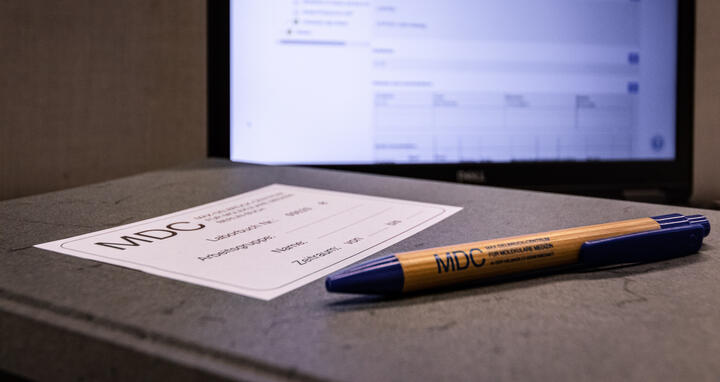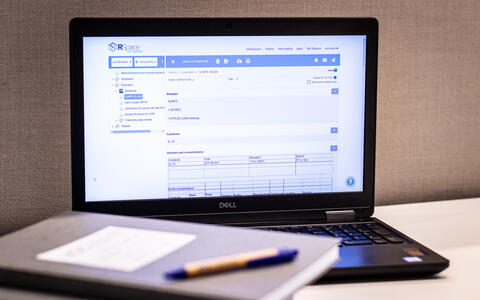Bye-bye, paper chaos!
Dr. Özlem Özkan is a research data manager at the MDC.
Increasing numbers of scientists at the MDC want to use digital lab notebooks to record their research data. Are the days of scribbled, disorganized laboratory notes over?
These days, almost everything can be digital – so why not lab notebooks too? Researchers can simply log into their smartphone or computer and enter data into their electronic lab notebook, or simply “ELN.”
Aren’t handwritten notes more straightforward and less time-consuming?
It’s true that some people have a hard time breaking out of their old routines, and so they continue to take a paper notebook into the laboratory instead of a laptop or smartphone. But people who familiarize themselves with how an ELN works can actually save lots of time. For example, if they want to share findings with colleagues in their own lab or elsewhere, or if science journals are requesting original data. In handwritten notebooks it can be difficult to quickly track down raw data, images, protocols or statistics. In an ELN, scientists can organize their work chronologically and according to project, and they can link up different data and experiments. They can also use the search function to track down protocols and reuse them when needed. If, for example, I were to repeat an experiment three years later, the ELN entries will enable me to see what I did differently on different days. Often, that gives a good explanation of divergent findings. This kind of direct comparison at a single glance is not usually possible with paper notes.
- The ELN
-
in a nutshell
-
Data and results that are intended to be subsequently published in scientific journals must be stored in a well-organized and structured way so that they can be easily accessed later and properly archived. That’s especially important when team members switch to another lab or are involved in new inventions or discoveries. Digital tools allow research teams to sensibly document the experiments, studies, collaborations and findings of all team members.
What other advantages are there?
With an ELN you can go back to an experiment at any point in time. That can be useful for sorting out problems regarding intellectual property rights. Who did which experiment and when? Under what conditions and with what results? What’s more, I’ll have access to older versions. That’s very useful if I have changed something in my experiment or analyses and want to take a look at the data I collected originally. And an ELN can’t get lost, be forgotten somewhere, or have coffee spilled on it.
Are MDC researchers already working with an ELN?
Yes, some of them are. But several research labs also are working with open source tools; there are many commercial and freely accessible ELN tools out there. However, given data privacy and security laws, it’s better to use a system that is installed and supported locally at the MDC. The data are then held securely by the MDC, conforming to our research data management policy.
So the MDC provides its researchers with an ELN tool?
For the pilot phase in 2022 we have acquired 200 RSpace licenses. Depending on demand, we will plan to purchase more for the following years. However, it will take time for research labs to integrate the system into their daily routine and overall lab management and for everyone to switch from paper notebooks to an ELN. That’s not something that will happen overnight.
How can you and the rest of the team help MDC researchers to adapt?
We meet personally with every research lab that is interested in working with RSpace. That way, we can find out exactly what the scientists need. Later on, we help them set it up. We work together to adapt the file structure and give advice so that every lab can work with an ELN that is tailored to their specific work processes. A total of 140 MDC researchers have already taken part in RSpace training sessions and we are currently setting up the system with the first ten research labs. We hope that many more labs will follow suit and that they can benefit from the successful experiences their colleagues have already had with RSpace. Our team also offers ongoing training in the use of RSpace.
Christina Anders conducted the interview.
The team from the "Scientific Infrastructure" department is to bring the ELN to the MDC labs. About 200 "RSpace" licenses are ready to use.
Electronic lab notebooks at the MDC – the team behind the project
Dr. Özlem Özkan has several years of experience in IT and data science and works together with Dr. Inga Patarčić in the Research Data Management Team, which is part of the MDC’s Scientific Infrastructures Department. Patarčić was previously a PhD student in bioinformatics at the MDC and is well acquainted with the processes at the Center and with the topic of data storage. The data managers work closely together with Dr. Manuel Ehling, also from the Scientific Infrastructures Department, who has postdoc experience in the wet lab and knows the challenges researchers face when documenting experiments in the lab.
Further information
MDC Research Data Management Policy






